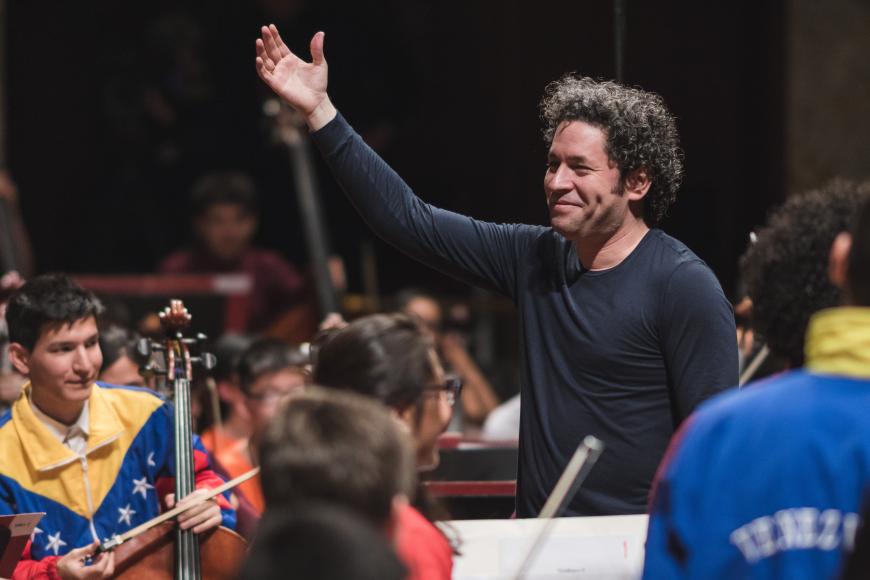
Gustavo Dudamel has had quite the year on film. The conductor was at the Academy Awards last month, celebrating the work he did leading the orchestra for Steven Spielberg’s remake of West Side Story. Now, he’s staying on the podium but also coming to the cinematic fore as the subject of ¡Viva Maestro! — a new documentary in theaters this month and set to stream on Amazon and Apple TV beginning May 24.
Of course, celebrity hasn’t exactly eluded Dudamel. Even before taking the helm of the Los Angeles Philharmonic in 2009, he had established himself as one of classical music’s superstars. Longtime followers of the conductor — now 41 and doing double duty as music director of the Paris Opera — should be all the more surprised then. ¡Viva Maestro! is the first feature-length documentary about this musician whose career has been inseparable from the story around him.
All the essential Dudamel elements are there, from energetic performances in some of the world’s great concert halls to rehearsals with the young players in El Sistema. The public music-education program in Venezuela, which the conductor is both the product of and champion for, is necessarily at the heart of the film. The “maestro” in the title refers both to Dudamel and to his mentor (and El Sistema’s founder) José Antonio Abreu.
But ¡Viva Maestro! also captures an important turn in the conductor’s career. In 2017, violent protests broke out in Venezuela, eventually leading Dudamel to pen an opinion piece for The New York Times critical of President Nicolás Maduro’s government. The fallout that ensued — Dudamel has been unable to return to his native country since — shifted the direction of the documentary, too.
The film starts in Caracas, with the conductor leading El Sistema’s flagship ensemble, the Simón Bolívar Orchestra, in a rehearsal of Beethoven’s Fifth Symphony. The scene doesn’t stay long in the city, however.
“We’d intended to return to Venezuela for two, maybe three more shoots after the initial visit in February 2017,” the documentary’s director, Theodore Braun, explained. “But Gustavo never returned to Venezuela. So we had to make a series of adjustments to what we shot.”
Dudamel and the Bolívar musicians were set for international tours later in 2017, which the Maduro government would ultimately cancel. Reconnecting with the orchestra’s members abroad — in Mexico City, Santiago, and Berlin — became a central part of the story, as Dudamel and the production team viewed the political unrest in Venezuela from afar.

This presented a challenge as far as editing went: how to depict the problems in Venezuela without actually being there. “This was a particularly stiff cinematic test,” Braun revealed. “The solution we came up with — a combination of Gustavo’s own words from that time, still photographs from the protests, recollections from members of the orchestra, and some beautifully designed animated sequences — is something I’m proud of.”
In fact, Braun is no stranger to volatile situations as a filmmaker; a previous project was the 2007 documentary Darfur Now. He points out that the obstacles encountered during the production of ¡Viva Maestro! are really what the form is all about.
“Filmmaking of the sort we set out to do typically follows subjects as they pursue something they value in the face of the problems of their lives,” he said. “In that sense, what we faced with Gustavo and Venezuela was simple and familiar — represent the difficulties the subject of the film encounters as he pursues his goals.”
And as ¡Viva Maestro! makes clear, those goals always come back to the music. “From the outset we were interested in making a film that focused on Dudamel’s drive to bring music — art and beauty — into the world,” Braun said. “And in doing so to transform the world, particularly the lives of young people.”
¡Viva Maestro! is now showing at Landmark Theatres in Los Angeles, San Francisco, and Berkeley and will be available to stream on Amazon and Apple TV starting May 24.



